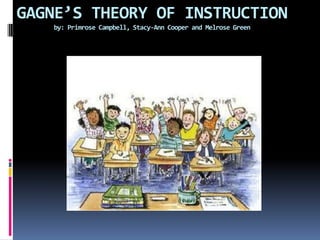
Gagne’s theory of instruction revised
- 1. GAGNE’S THEORY OF INSTRUCTIONby: Primrose Campbell, Stacy-Ann Cooper and Melrose Green
- 2. ROBERT GAGNE (1916 - 2002) Conditions of Learning BiographyRobert Gagne's distinguished career began with a bachelor's degree from Yale in 1937, and a Ph.D. in 1940 from Brown University. He served on the faculties of Connecticut College (1940 - 1949), Penn State University (1945 - 1946), the US Air force (1949 - 1958), and at Florida State University until his death in 2002. Gagne's major contributions were as an experimental psychologist who worked with learning and instructional methods. His landmark book, "The Conditions of Learning" was published in 1965. He also co-authored "Principles of Instructional Design". TheoryGagne linked learning outcomes with instructional designs.
- 3. Gagne’s Conditions of Learning Theory Five major types of learning levels are identified: verbal information intellectual skills cognitive strategies motor skills attitudes
- 4. According to Robert Gagne, there are nine events that activate processes needed for effective learning. Gagne believed all lessons should include this sequence of events. He believed that basic concepts must be understood first before moving to a higher level. The theory outlines nine instructional events and corresponding cognitive processes.
- 5. Events: Gaining attention (reception) Informing learners of the objective (expectancy) Stimulating recall of prior learning (retrieval) Presenting the stimulus (selective perception) Providing learning guidance (semantic encoding) Eliciting performance (responding) Providing feedback (reinforcement) Assessing performance (retrieval) Enhancing retention and transfer (generalization).
- 6. Implications for learning Since lessons are tailored for students (student centered): Students become actively involved in lessons. Learner will feel motivated. Learner will be more focused on the content.
- 7. Implications for teaching . While Gagne's theoretical framework covers all aspects of learning, the focus of the theory is on intellectual skills. The theory has been applied to the design of instruction in all domains. These events should satisfy or provide the necessary conditions for learning and serve as the basis for designing instruction and selecting appropriate media.
- 8. The role of the teacher. Instructors begin by identifying learning outcomes desired for the course. In theory, the teaching objectives you identify for your course should fall into one of the following forms of learning: verbal information, intellectual skills, cognitive strategies, attitudes, or motor skills.
- 9. The role of the teacher continued. Once student learning outcomes are established, context must be considered—specifically the conditions needed for learning to occur (both internally and externally). It is important to remember that special conditions must be met for different types of learning.
- 10. Contextualize Instruction Description: Allow the learner to take ownership of the lesson by providing a customized, meaningful learning experience. Strategies: Ways to contextualize instruction for learners include: Gain attention of the learner Relate instructional goals to the learner State the outcomes of the instruction Present overviews and organizers Adapt content of the instruction to the learner Provide cases related to the content
- 11. The role of the teacher continued. A teacher should give frequent written and oral tests . A teacher should employ a variety of instructional strategies in classroom. A teacher should use Gagne conditions for learning in lesson planning.
- 12. Disadvantages: The theory is very systematic and rigid at most points. The systematic nature of the theory may be a turn-off for many teachers, particularly those who like to be creative. The theory is not always easy to implement. Many times it is difficult to take the goals a teacher had for students, put them into the correct learning outcome category, and then create objectives using Gagne's standard verbs.
- 13. Advantages: The domains of learning helps teachers better organize their thoughts and the objectives of the instructional lesson (it is a good way to put more structure into the objectives of lesson plans). The domains of learning helps teachers to better understand what types of learning to expect to see from their students.